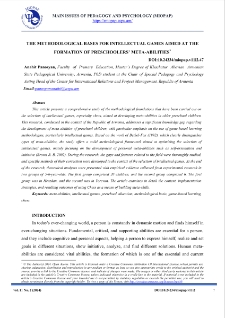Օբյեկտ
Վերնագիր: The Methodological Bases For Intellectual Games Aimed At The Formation Of Preschoolers’ Meta-Abilities
Ամսագրի կամ հրապարակման վերնագիր:
Հրապարակման ամսաթիվ:
Հատոր:
Համար:
ISSN:
Պաշտոնական URL:
Համատեղ հեղինակները:
Խաչատուր Աբովյանի անվան հայկական պետական մանկավարժական համալսարան
Ծածկույթ:
Ամփոփում:
This article presents a comprehensive study of the methodological foundations that have been carried out on the selection of intellectual games, especially chess, aimed at developing meta-abilities in older preschool children. This research, conducted in the context of the Republic of Armenia, addresses a significant knowledge gap regarding the development of meta-abilities of preschool children, with particular emphasis on the use of game-based learning methodologies, particularly intellectual games. Based on the work of Bethel-Fox (1992), which clearly distinguishes types of meta-abilities, the study offers a solid methodological framework aimed at optimizing the selection of intellectual games, mainly focusing on the development of personal meta-abilities such as self-orientation and initiative (Brown R. B, 2002). During the research, the gaps and features related to the field were thoroughly studied, and specific methods of their correction were developed in the context of the selection of intellectual games. At the end of the research, theoretical analyses were presented with empirical evidence collected from experimental research in two groups of 5-6-year-olds. The first group comprised 20 children, and the second group comprised 6. The first group was in Hrazdan, and the second was in Yerevan. The article examines in detail the content, implementation strategies, and resulting outcomes of using Chess as a means of building meta-skills.
Հրատարակության վայրը:
Երևան
Հրատարակիչ:
Ձևաչափ:
Նույնացուցիչ:
oai:arar.sci.am:381879
Օբյեկտի հավաքածուներ:
Վերջին անգամ ձևափոխված:
Feb 11, 2025
Մեր գրադարանում է սկսած:
Feb 11, 2025
Օբյեկտի բովանդակության հարվածների քանակ:
45
Օբյեկտի բոլոր հասանելի տարբերակները:
https://arar.sci.am/publication/413242
Ցույց տուր նկարագրությունը RDF ձևաչափով:
Ցույց տուր նկարագրությունը OAI-PMH ձևաչափով։
-
Մանկավարժության և հոգեբանության հիմնախնդիրներ=Проблемы педагогики и психологии= Main Issues of Pedagogy and Psychology
-
Մանկավարժության և հոգեբանության հիմնախնդիրներ, 2013, Հատոր 1, 1
-
Մանկավարժության և հոգեբանության հիմնախնդիրներ, 2013, Հատոր 1, 2
-
Մանկավարժության և հոգեբանության հիմնախնդիրներ, 2013, Հատոր 1, 3
-
Մանկավարժության և հոգեբանության հիմնախնդիրներ, 2014, Հատոր 2, 1
-
Մանկավարժության և հոգեբանության հիմնախնդիրներ, 2014, Հատոր 2, 2
-
Մանկավարժության և հոգեբանության հիմնախնդիրներ, 2014, Հատոր 2, 3
-
Մանկավարժության և հոգեբանության հիմնախնդիրներ, 2015, Հատոր 3, 1
-
Մանկավարժության և հոգեբանության հիմնախնդիրներ, 2015, Հատոր 3, 2
-
Մանկավարժության և հոգեբանության հիմնախնդիրներ, 2015, Հատոր 3, 3
-
Մանկավարժության և հոգեբանության հիմնախնդիրներ, 2016, Հատոր 4, 1
-
Մանկավարժության և հոգեբանության հիմնախնդիրներ, 2016, Հատոր 4, 3
-
Մանկավարժության և հոգեբանության հիմնախնդիրներ, 2017, Հատոր 5, 1
-
Մանկավարժության և հոգեբանության հիմնախնդիրներ, 2017, Հատոր 5, 2
-
Մանկավարժության և հոգեբանության հիմնախնդիրներ, 2017, Հատոր 5, 3
-
Մանկավարժության և հոգեբանության հիմնախնդիրներ, 2018, Հատոր 6, 1
-
Main Issues Of Pedagogy And Psychology, 2020, vol. 7, 1
-
Main Issues Of Pedagogy And Psychology, 2020, vol. 7, 2
-
Main Issues Of Pedagogy And Psychology, 2021, vol. 8, 1
-
Main Issues Of Pedagogy And Psychology, 2021, vol. 8, 2
-
Main Issues Of Pedagogy And Psychology, 2022, vol. 9, 1
-
Main Issues Of Pedagogy And Psychology, 2022, vol. 9, 2
-
Main Issues Of Pedagogy And Psychology, 2023, vol. 10, 1
-
Main Issues Of Pedagogy And Psychology, 2023, vol. 10, 2
-
Main Issues Of Pedagogy And Psychology, 2024, vol. 11, 1
-
Main Issues Of Pedagogy And Psychology, 2024, vol. 11, 2
- Editorial board
- Contents
- The Methodological Bases For Intellectual Games Aimed At The Formation Of Preschoolers’ Meta-Abilities
- Psychological Diagnostics Of Destructive Motivation Of Personnel
- The Close Relationship Between Teacher Charisma And Effective Teaching
- “Chess” Educational Subject In Elementary School
- Integration Of The Scientific Method In Chess Teaching
- The Features Of Chess Teachers Training In Armenia
- Using Chess As An Instructional Tool: Teachers’ Experiences And Challenges
- The Benefit Of Solving Blindfolded Tactics In Young And Adult Players
- Prospects And Features Of Implementation Of Project-Based Learning In The Context Of "Chess" As A School Subject In Primary School
- Advantage Of Installing Moodle Learning Management System Under Iis/Mariadb Over Apache/MySQL
- Pedagogical Practice As A Means Of Forming A Future Teacher
- Chess As An Educational Tool
- Elementary School Students’ Reflections On Chess Learning Difficulties
- The Use Of Mini-Games In Chess Education
- Life Lessons From Teaching Chess
- Promoting Competencies Of The Brazilian Common National Curriculum With Chess
- Team Usage In Chess Instruction With Digital Technology
- Golden Page
-
Main Issues Of Pedagogy And Psychology, 2025, vol. 12, 1
-
Main Issues Of Pedagogy And Psychology, 2025, vol. 12, 2
-
Մանկավարժության և հոգեբանության հիմնախնդիրներ, 2013, Հատոր 1, 1
| Հրատարակության անուն | Ամսաթիվ |
|---|---|
| Panosyan, Anahit, The Methodological Bases For Intellectual Games Aimed At The Formation Of Preschoolers’ Meta-Abilities | Feb 11, 2025 |





